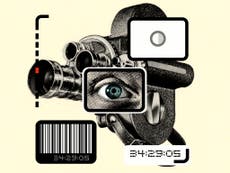The Below Deck and Love Is Blind drama is just the start of it
The question is not ‘why do people go on these shows’ but ‘why are these shows made?’


Your support helps us to tell the story
From reproductive rights to climate change to Big Tech, The Independent is on the ground when the story is developing. Whether it's investigating the financials of Elon Musk's pro-Trump PAC or producing our latest documentary, 'The A Word', which shines a light on the American women fighting for reproductive rights, we know how important it is to parse out the facts from the messaging.
At such a critical moment in US history, we need reporters on the ground. Your donation allows us to keep sending journalists to speak to both sides of the story.
The Independent is trusted by Americans across the entire political spectrum. And unlike many other quality news outlets, we choose not to lock Americans out of our reporting and analysis with paywalls. We believe quality journalism should be available to everyone, paid for by those who can afford it.
Your support makes all the difference.Reality TV and drama go together like birds of a – very ruffled – feather.
Fights, romance, scheming – these are the bread and butter of so-called reality shows. Whether it’s Netflix’s latest offering at ‘finding love’, or the well-trodden formats of Big Brother or Real Housewives, the endless channels have endless offerings. The increasingly staged and edited nature of reality shows should probably instead let them fall squarely in ‘drama’, but apparently ‘reality’ is where they remain.
The immensely popular Bravo show, Below Deck, aired an episode of its ‘Down Under’ spin-off this week, in which two cast members carried out unwanted sexual advances on their fellow crew members. The producers are being praised for intervening in both situations, which from the available footage it seems they did swiftly and professionally, but the question of why this was ever aired remains.
Amid the historic strikes rocking Hollywood, unscripted shows are facing a different kind of battle, with those in the industry reportedly struggling to find work, and creators asking questions around ‘when is someone considered a writer?’ As well as crew members, some reality TV stars have put their heads above the picket line parapet.
Love might be blind, but the contestants no longer seem to be. Season two star Nick Thompson (remember, the guy who didn’t like costumes then reluctantly dressed as corn?) claims the Netflix show “ruined [his] life” and is stopping him from finding employment. Speaking with The Daily Mail, Thompson said he was paid $10,000 for filming, which he estimates amounts to $7.14 an hour. Danielle Ruhl, who said “I do” to Thompson before their eventual divorce in 2022, has previously spoken out about their allegedly “unsafe” working conditions. The Independent has reached out to Netflix for comment.
In 2022, fellow season two contestant Jeremy Hartwell filed a lawsuit against the Netflix show, claiming that he and other contestants were subject to “inhumane working conditions”. Kinetic Content, which produces Love Is Blind, previously issued a statement to The Independent regarding the lawsuit last year, in which the firm said there was “no merit” to Harwell's claims and that the company would “vigorously defend against” them.
The tragic past of Love Island, Bachelor in Paradise allegations, Big Brother – the list of accusations seems to always be growing in this chaotic industry.
The knee-jerk reaction is, of course, accusatory: ‘what do you expect when you go on a show like that?’ Many times I’ve shouted something similar at the television, criticizing contestants for seeking fame and fortune without properly considering what the repercussions of such public humiliation may be.
I now feel entirely differently. As the reality of reality shows become more apparent – and, it seems, appalling – the question has gone from ‘why would you go on a show like that?’ to ‘why do they make shows like this?’
Reality TV may have been something I discovered later in life (having spent my arrogant adolescence thinking myself above it) but discover it I did. Love Is Blind, Below Deck, Married At First Sight, The Circle, Too Hot To Handle, Selling Sunset – I can reel off a dozen or more shows I’ve devoured in recent years. They numb the mind after a long day’s work, they distract you when life is hard, they give an easy-to-follow frivolity that sometimes we just need. But it seems our enjoyment of reality shows is starting to grow sour.
Take Love Is Blind as an example. On first watch, it seemed a silly, entertaining jolly to keep us sane during lockdown. Years later, scenes that were once funny or dramatic now sit uneasily; were they drunk there? Had they slept or eaten that day? If I wasn’t sure what day or time it was, and was fueled by hanger and nerves, would I have made a comment even worse than them?
Below Deck is the dream reality TV cocktail – rich people, romance, exotic locations, danger – but should shows funneling young people with alcohol, in the most confined of quarters, even be being made?
It may once have felt as if we painted reality stars as heroes or villains, making them our ‘water cooler moment’ topics. But that’s of course not the case. The people who make and edit the shows are the artists, giving little to no ambiguity to how we perceive the people we are watching. And they are people, real people. Yes, they have chosen to appear on these shows, but some have been scouted out, some need the money, and I am certain that most do not know the realities of what they’re signing up for.
Better regulation is desperately needed in television. Anyone involved in these money-making shows should be paid fairly, never be at risk of assault of any kind, and execs should be quicker to cut things that simply shouldn’t be aired. Once these necessary changes are made, we can all go back to obsessively binging the latest season of whatever trash tickles us most – guilt-free.



Join our commenting forum
Join thought-provoking conversations, follow other Independent readers and see their replies
Comments